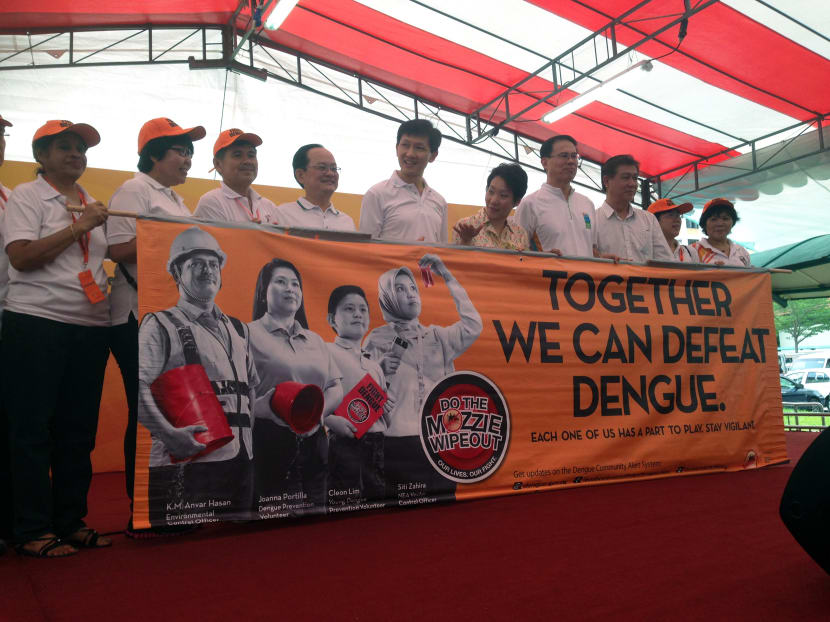NEA looking to infect Aedes mosquitoes in dengue fight
SINGAPORE — For the first time, the National Environment Agency (NEA) is considering the use of biological control methods to limit the spread of dengue, by infecting male Aedes mosquitoes with a type of bacteria that results in females producing eggs that do not hatch.

The National Environment Agency is considering the use of biological control methods to limit the spread of dengue, by infecting male Aedes mosquitoes with a type of bacteria that results in females producing eggs that do not hatch. Photo: Amanda Lee
SINGAPORE — For the first time, the National Environment Agency (NEA) is considering the use of biological control methods to limit the spread of dengue, by infecting male Aedes mosquitoes with a type of bacteria that results in females producing eggs that do not hatch.
The NEA’s Environmental Health Institute (EHI) has tested the use of the Wolbachia bacteria in the laboratory, but not in the field. A panel of experts has been set up and will convene in August to look into whether the use of the technology — which has been around since the ’60s and is being tested in Vietnam, Indonesia and Australia — is safe.
There was a record 22,170 dengue cases last year. About 7,000 cases have been reported this year, with the traditional peak period — June to October — only beginning.
Announcing the NEA’s plans at the launch of the Do The Mozzie Wipeout campaign yesterday, Second Minister for the Environment and Water Resources, Ms Grace Fu, said the Government had found the Wolbachia method to be interesting and probably applicable. “We are not under any pressure, of course. We want to fight dengue as quickly as we can, but we also want to make sure the study is thorough and safe,” she added.
Wolbachia technology involves infecting Aedes mosquitoes with Wolbachia — a naturally-occurring bacterium found in more than 60 per cent of insect species. When a male Aedes mosquito carrying Wolbachia mates with a female, the eggs produced do not hatch. The aim is to reduce the Aedes population to a level where dengue transmission cannot be sustained.
While the number of dengue cases so far this year is about 25 per cent below that of the same period last year, Ms Fu said this was still too high.
The Dengue Expert Advisory Panel consists of local and foreign experts and is led by epidemiologist and entomologist Professor Duane Gubler, founding director of the Emerging Infectious Diseases Programme at Duke-NUS Graduate Medical School.
Commenting on the Wolbachia method, Prof Gubler said in an email: “The main advantage of this and the other new methods in the pipeline is that they will control the mosquitoes that are breeding in hidden larval habitats that cannot be controlled by current methods.”
Lab studies by the EHI have shown that mosquitoes carrying Wolbachia have lower transmission potential for all dengue serotypes, as well as for the chikungunya virus. Preliminary data has also shown that male Aedes mosquitoes carrying Wolbachia can compete with wild males for female attention.
However, Monash University Dean of Science Scott O’ Neill said although the technology was powerful, releasing only male mosquitoes with the bacteria is not the most effective. Releasing both males and females infected with the bacteria would greatly reduce the ability of resident mosquitoes to transmit dengue between people, he said. He also noted that the approach Singapore was considering could be costly, as it will require continual releases of male mosquitoes to control the wild mosquito population.
Prof Gubler said other new technologies for tackling dengue could become available in the next three to five years. “These include new insecticides, genetically-modified mosquitoes (sterile male release), vaccines, antiviral drugs and therapeutic antibodies. None will likely be totally effective when used in isolation, but all show great promise if used in an integrated and synergistic programme,” he said.
Meanwhile, Ms Fu said the NEA had conducted more than 1.5 million inspections this year and would continue to focus on areas that have higher potential for dengue transmission. As of June 9, the NEA has issued 373 notices to attend court and 34 stop-work orders. There were 16 court prosecutions involving eight contractors.






